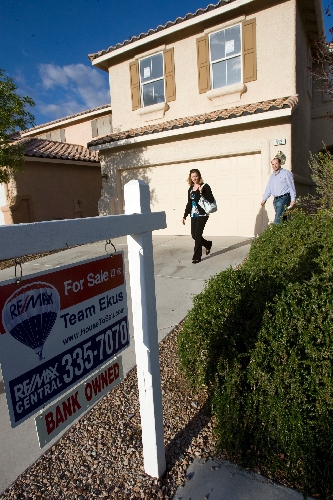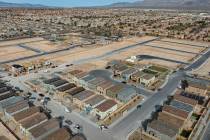Lenders say they can deal with raised foreclosure fee
Local lenders aren't overjoyed about a new foreclosure filing fee the Legislature adopted this week to help balance the state budget, but most of them doubt it will have much impact on their business.
Lawmakers boosted the fee paid for posting a default notice, a step in foreclosing on real estate, to $200 from $50.
"We're not happy to be paying more, but we're willing to pay it," said Brad Beal, chief executive officer of Nevada Federal Credit Union. "If it helps the state infrastructure, we want to do that."
Bill Ferrence, general manager of Boulder Dam Credit Union, said he was unconcerned about the tax.
"I think it will be basically for us immaterial. Two hundred dollars in any real estate transaction is such a minor amount," he said.
If it helps to solve the state's $887 million financial shortfall, Ferrence said he supports the fee.
Lawmakers informally estimated the increased fee will generate about $14 million in additional revenue for the state, he said. William Uffelman, chief executive officer of the Nevada Bankers Association, said he has no way of knowing how much revenue the measure will raise annually.
He said the timing for the new fee is bad, though.
"Particularly in Nevada, the economy is barely treading water," Uffelman said. "It bounces off the bottom and is getting gasps of air when it hits the top."
Diane Fearon, chief executive officer at Bank of George, said the fee increase "seems unfair" because lenders bear the burden of the higher fee at a time when they already are under distress and are trying to resolve loans that are in default.
The new law states that the lender, not the borrower, must pay the fee despite contractual agreements to the contrary in many existing loan documents, Uffelman said.
The fee applies to credit unions, banks and other lenders, and the fee is the same regardless of the size of the loan or type of loan, residential or commercial.
Uffelman believes the lender will be required to pay the fee for each loan involved in any foreclosure, including both the first mortgage loan and second mortgage, such as a home equity loan.
Community banks in Nevada typically make few or no residential mortgage loans, so most of the lenders think the impact on them will be minimal.
They will pay the fee on commercial real estate loans, which typically are for larger amounts. However, large national institutions, such as Bank of America, and some local credit unions made numerous residential mortgage loans, making the fee potentially more onerous for them.
However, Wayne Tew, chief executive officer of Clark County Credit Union, predicted the impact won't be "that dramatic" on his credit union.
"We're not doing too many foreclosures," he said. Legislators "are looking for revenue anywhere they can find it," Tew said.
Public anger at bankers in general made financial institutions an easy target for higher fees, analysts said.
Tew said all lenders have been painted with the same broad brush as those who made irresponsible loans that led to the real estate collapse.
Lenders say that politicians realize that most voters don't know the difference between commercial banks, which make loans to businesses and consumers, and investment banks on Wall Street, which were involved in complicated derivative securities that contributed to the near-collapse of the country's financial system.
"If it has bank in the name, it must be evil," Uffelman said.
Added Bank of George's Fearon: "We are viewed unfairly by many in the public, and I find that very unfortunate."
Community banks are committed to helping local businesses, she said, and they didn't make subprime residential loans or deal in financial derivatives.
Contact reporter John G. Edwards at jedwards@reviewjournal.com or 702-383-0420.






















